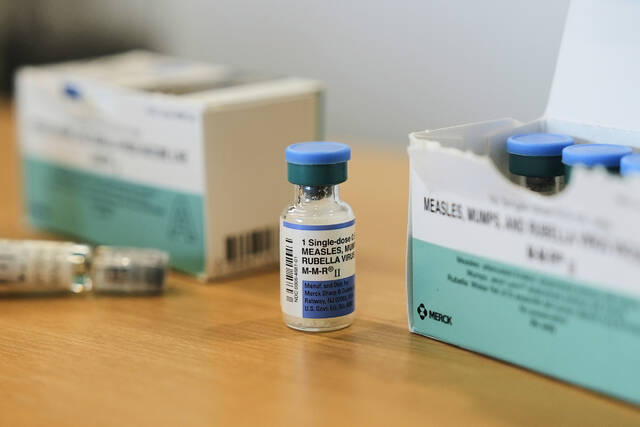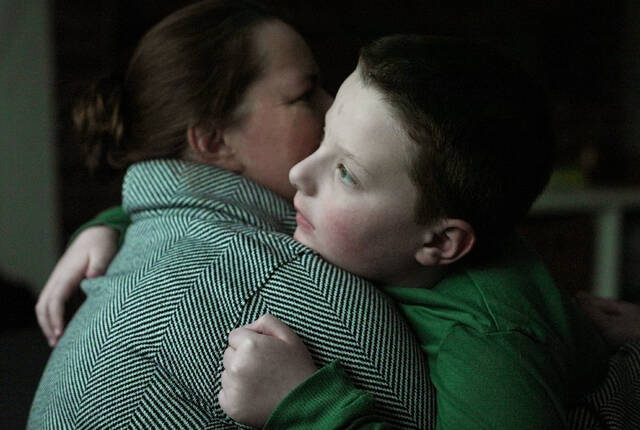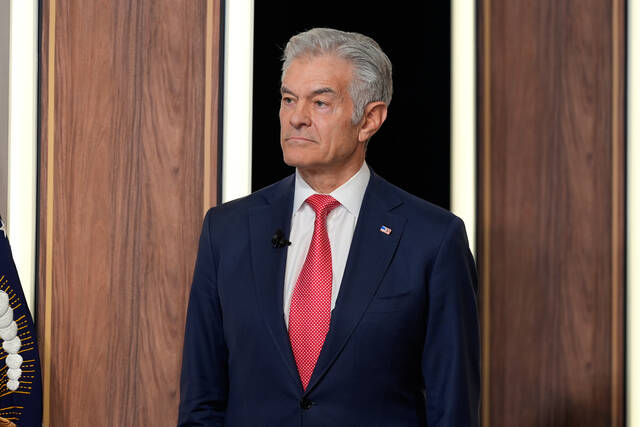A federal recommendation against giving youngsters a single catchall shot for measles, mumps, rubella and chickenpox falls in line with existing practices, medical experts told TribLive Friday.
The combined vaccine, abbreviated as MMRV, should no longer be given to children under 4 years old, the Advisory Committee on Immunization Practices said Thursday.
Dr. Joseph Aracri, chair of pediatrics at Allegheny Health Network, views the change as clinically sound.
“Because of the higher risk of fevers and side effects, it’s actually safer to give it separately than together,” Aracri said.
The move reflects the empowerment of vaccine skeptics who now dominate the panel that made the recommendation Thursday, according to Dr. Amesh Adalja, a Pittsburgh-based infectious disease expert, .
“This is old stuff that had been discussed and dealt with before,” Adalja said. “They’re not trying to get it right or anything. They’re trying to do what the anti-vaccine movement wants them to do.”
Its guidance awaits final approval from the Centers for Disease Control and Prevention director.
Panelists left unchanged recommendations for separate immunizations against the diseases — a combined one for measles, mumps and rubella, and a different one for chickenpox.
A distinct measles, mumps and rubella vaccine can be given in the same visit with the chickenpox shot. The only advantage of the combination shot, in Aracri’s view, is the child gets one jab instead of two.
Dr. Paul Offit, a vaccine expert based at Children’s Hospital of Philadelphia, sees that as a valid reason to get the single shot in cases where children have a fear of needles and parents understand the risks.
“Basically, they just took away that personal choice,” Offit said.
Only 15% of families are opting for the all-in-one shot, according to Adalja. That means the panel’s guidance won’t have much impact on vaccination practices for these diseases.
But he’s troubled that the panel, populated with vaccine skeptics by Health and Human Services Secretary Robert F. Kennedy Jr., would concern itself with what he called a “nonissue.”
Doctors have known about these side effects and advised parents of them for years. The fact the panel is acting now suggests to Adalja it has political, not scientific, motives.
“The anti-vaccine movement has always railed against combination vaccines,” he said. “You just have to look at this as if you watched an anti-vax conference that’s going on in some hotel.”
What are these shots?
The first dose of these vaccines — whether it’s the all-in-one or separate shots — are usually given to children between 12 and 15 months old, according to the Mayo Clinic.
That’s followed by another dose between the ages of 4 and 6.
Mumps, rubella and chickenpox are usually mild viruses but can lead to serious complications. Measles is considered the most severe and contagious.
Because these diseases spread easily, it’s important that an overwhelming majority of people are vaccinated against them to achieve herd immunity, according to Aracri.
The combination shot has been linked to a higher risk of fever as a child’s body provides an immune response, which can lead to seizures.
These seizures are common in young children with any type of infection, especially those between 12 and 18 months old, per the Mayo Clinic.
They’re considered harmless by medical experts, and are not tied to any developmental issues or long-term seizure disorders.
“Febrile seizures are usually worse for the parent than they are the kid,” Aracri said.
What could change at the doctor’s office?
The panel’s recommendations won’t become official Centers for Disease Control and Prevention policy until approved by the agency’s acting director, Jim O’Neill.
Even then, the agency is merely advising doctors.
Physicians have historically given weight to advice from the agency. But as it continues to veer away from scientific consensus on vaccines under Kennedy’s Department of Health and Human Services, many have lost faith.
Offit said panelists have asked basics questions this week about vaccine components and key federal programs, reflecting their lack of expertise.
“It was a clown show,” he said.
To fill the void, states and medical associations have started issuing their own guidance.
Brittany Radomski of O’Hara, a pharmacist with the nonprofit Bethany Community Ministries in Pittsburgh’s Homewood neighborhood, has been turning to the American Association of Family Physicians, the American College of Obstetricians and Gynecologists and similar groups for guidance on giving vaccines.
“This has been the hardest couple of months I’ve had in a while,” Radomski said of navigating the drastic changes to federal health advisory and regulatory bodies.
Each shift in vaccine recommendations is confusing and expensive for pharmacists, who may have to change which shots they stock, she added.
Parents are also left with grappling with shifting information on how and when their children should get certain vaccines.
Even just seeing vaccine changes in the news can be disorienting, said Leslie Francis, 45, of Beechview as she watched her 2-year-old daughter, Isabella, play at Brookline’s Moore Park on Friday.
She said her husband had just read a news story about federal advisors altering guidelines for some childhood immunizations.
“He didn’t like that,” she said.
Belle Mulhern of Jeannette, who has a 10-month-old girl and another child on the way, has concerns her family could end up on the wrong side of shifting vaccine recommendations. Her daughter is approaching the ideal age for the first dose of measles, mumps, rubella and chickenpox immunizations.
“Every parent wants to make the best decision and do what’s right,” she said. “I worry about making the wrong decision and there’s new information coming out afterwards — that makes me doubt myself.”
What will insurers do?
So far, insurers say they’ll continue to cover the combination shot and other vaccines possibly impacted by the panel’s meeting.
America’s Health Insurance Plans, a trade association representing insurers, said Tuesday its members will continue to cover all vaccines recommended by the panel as of Sept. 1.
Highmark spokesman Aaron Billger said his organization has not changed its coverage or medical policies on vaccines.
“Members should be always consulting with their physician about personal health care needs, including vaccines for themselves or their children,” Billger added.
UPMC did not immediately return a request for comment.
The panel voted Thursday the Vaccines for Children program, a federal initiative that provides no-cost vaccines for eligible children, could cover the combined shot if parents want it. On Friday, it reversed the decision.
Could other vaccines be impacted?
Panelists had planned to weigh whether to stop recommending the hepatitis B vaccine for newborns.
It delayed that vote indefinitely Friday morning.
The panel is expected to vote later Friday on who should get the season’s covid-19 shots.
Last month, the federal Food and Drug Administration limited the new boosters to adults 65 and older as well as younger people with risk factors for severe infection.
Staff writers Julia Burdelski, Tom Davidson, Quincey Reese and Renatta Signorini contributed to this report.








